医护英语500句讲解
- 格式:pdf
- 大小:27.86 KB
- 文档页数:11
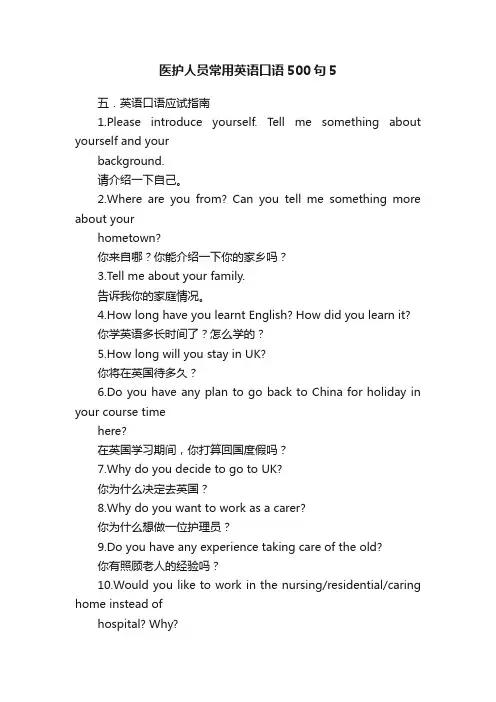
医护人员常用英语口语500句5五.英语口语应试指南1.Please introduce yourself. Tell me something about yourself and yourbackground.请介绍一下自己。
2.Where are you from? Can you tell me something more about yourhometown?你来自哪?你能介绍一下你的家乡吗?3.Tell me about your family.告诉我你的家庭情况。
4.How long have you learnt English? How did you learn it?你学英语多长时间了?怎么学的?5.How long will you stay in UK?你将在英国待多久?6.Do you have any plan to go back to China for holiday in your course timehere?在英国学习期间,你打算回国度假吗?7.Why do you decide to go to UK?你为什么决定去英国?8.Why do you want to work as a carer?你为什么想做一位护理员?9.Do you have any experience taking care of the old?你有照顾老人的经验吗?10.Would you like to work in the nursing/residential/caring home instead ofhospital? Why?你愿意到养老院工作吗?为什么?11.How do you think working in UK will improve or help your career andfuture?你认为在英国12.How do you feel if you can not use your nursing skills and only can workas a carer? Why?如果能施展你的护理技能而仅仅做护理员的工作,你觉得能如何?为什么?13.Why should I give you this job? (Tell me about your good points)我为什么要聘用你?(告诉我你的优点)14.What do you see your future after the course is finished?课程结束后,你将来打算做什么?15.Are you in good health? /Are you healthy?你身体健康吗?16.What are your hobbies?你的爱好是什么?17.Who is the most important person in your life?你生命中最重要的人是谁?18.Why do you choose to be a nurse?你为什么选择做一名护士?19.Do you have any plans in the following 5 years?在未来的五年中你有哪些打算呢?20.What kinds of sports do you like?你喜欢哪些体育运动?21.What kinds of TV shows do you like?你喜欢什么样的电视节目?22.What will you do when you are free??在你空闲的时候都做些什么?23.When is your birthday?你的生日是什么时候?24.Can you remember your parents’ birthday?你能记住你父母的生日吗?25.What color do you like best? Why?你最喜欢什么颜色?为什么?。
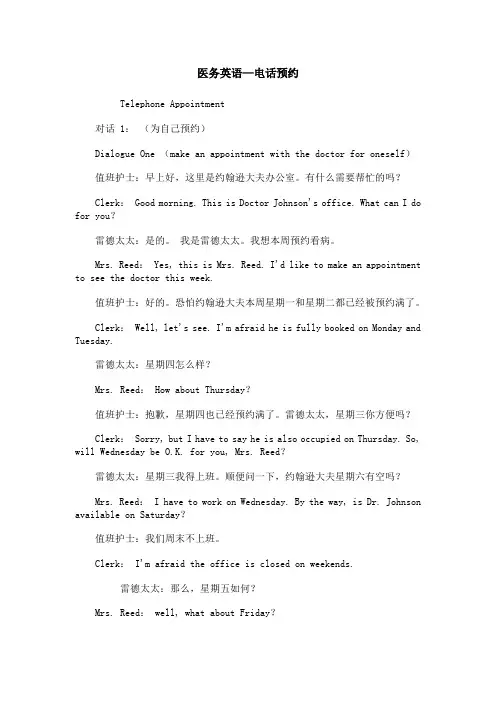
医务英语—电话预约Telephone Appointment对话 1:(为自己预约)Dialogue One (make an appointment with the doctor for oneself)值班护士:早上好,这里是约翰逊大夫办公室。
有什么需要帮忙的吗?Clerk: Good morning. This is Doctor Johnson's office. What can I do for you?雷德太太:是的。
我是雷德太太。
我想本周预约看病。
Mrs. Reed: Yes, this is Mrs. Reed. I'd like to make an appointment to see the doctor this week.值班护士:好的。
恐怕约翰逊大夫本周星期一和星期二都已经被预约满了。
Clerk: Well, let's see. I'm afraid he is fully booked on Monday and Tuesday.雷德太太:星期四怎么样?Mrs. Reed: How about Thursday?值班护士:抱歉,星期四也已经预约满了。
雷德太太,星期三你方便吗?Clerk: Sorry, but I have to say he is also occupied on Thursday. So, will Wednesday be O.K. for you, Mrs. Reed?雷德太太:星期三我得上班。
顺便问一下,约翰逊大夫星期六有空吗?Mrs. Reed: I have to work on Wednesday. By the way, is Dr. Johnson available on Saturday?值班护士:我们周末不上班。
Clerk: I'm afraid the office is closed on weekends.雷德太太:那么,星期五如何?Mrs. Reed: well, what about Friday?值班护士:星期五。
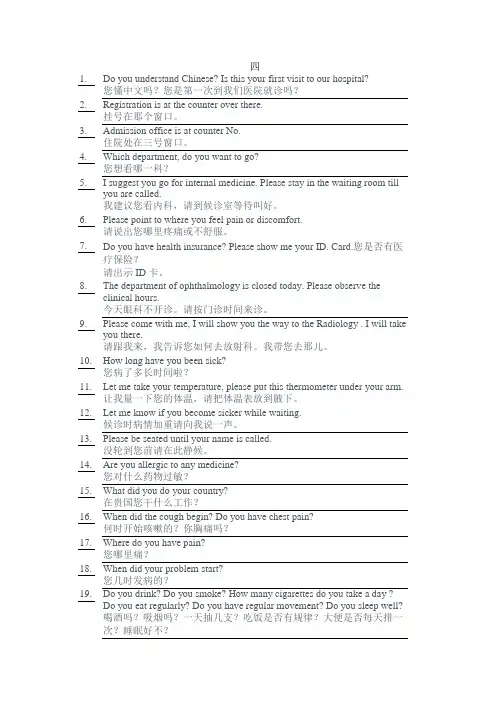
四1.Do you understand Chinese? Is this your first visit to our hospital?您懂中文吗?您是第一次到我们医院就诊吗?2.Registration is at the counter over there.挂号在那个窗口。
3.Admission office is at counter No.住院处在三号窗口。
4.Which department, do you want to go?您想看哪一科?5.I suggest you go for internal medicine. Please stay in the waiting room tillyou are called.我建议您看内科,请到候诊室等待叫好。
6.Please point to where you feel pain or discomfort.请说出您哪里疼痛或不舒服。
7.Do you have health insurance? Please show me your ID. Card.您是否有医疗保险?请出示ID卡。
8.The department of ophthalmology is closed today. Please observe theclinical hours.今天眼科不开诊。
请按门诊时间来诊。
9.Please come with me, I will show you the way to the Radiology . I will takeyou there.请跟我来,我告诉您如何去放射科。
我带您去那儿。
10.How long have you been sick?您病了多长时间啦?11.Let me take your temperature, please put this thermometer under your arm.让我量一下您的体温,请把体温表放到腋下。
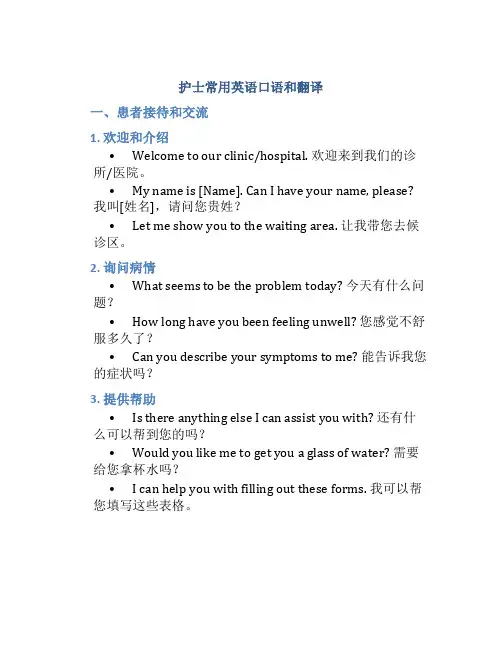
护士常用英语口语和翻译一、患者接待和交流1. 欢迎和介绍•Welcome to our clinic/hospital. 欢迎来到我们的诊所/医院。
•My name is [Name]. Can I have your name, please? 我叫[姓名],请问您贵姓?•Let me show you to the waiting area. 让我带您去候诊区。
2. 询问病情•What seems to be the problem today? 今天有什么问题?•How long have you been feeling unwell? 您感觉不舒服多久了?•Can you describe your symptoms to me? 能告诉我您的症状吗?3. 提供帮助•Is there anything else I can assist you with? 还有什么可以帮到您的吗?•Would you like me to get you a glass of water? 需要给您拿杯水吗?•I can help you with filling out these forms. 我可以帮您填写这些表格。
二、医疗操作和指导1. 医疗操作•I need to take your blood pressure. 我需要给您量血压。
•Please roll up your sleeve for the injection. 请卷起袖子,我要给您打针。
•You may feel a little discomfort during the procedure. 在操作过程中可能会感到些许不适。
2. 健康指导•It’s important to follow the doctor’s ins tructions for recovery. 遵循医生的指示对康复很重要。
•Remember to take your medication as prescribed. 记得按医嘱服药。

医务英语—电话预约Telephone Appointment对话 1:(为自己预约)Dialogue One (make an appointment with the doctor for oneself)值班护士:早上好,这里是约翰逊大夫办公室。
有什么需要帮忙的吗?Clerk: Good morning. This is Doctor Johnson's office. What can I do for you?雷德太太:是的。
我是雷德太太。
我想本周预约看病。
Mrs. Reed: Yes, this is Mrs. Reed. I'd like to make an appointment to see the doctor this week.值班护士:好的。
恐怕约翰逊大夫本周星期一和星期二都已经被预约满了。
Clerk: Well, let's see. I'm afraid he is fully booked on Monday and Tuesday.雷德太太:星期四怎么样?Mrs. Reed: How about Thursday?值班护士:抱歉,星期四也已经预约满了。
雷德太太,星期三你方便吗?Clerk: Sorry, but I have to say he is also occupied on Thursday. So, will Wednesday be O.K. for you, Mrs. Reed?雷德太太:星期三我得上班。
顺便问一下,约翰逊大夫星期六有空吗?Mrs. Reed: I have to work on Wednesday. By the way, is Dr. Johnson available on Saturday?值班护士:我们周末不上班。
Clerk: I'm afraid the office is closed on weekends.雷德太太:那么,星期五如何?Mrs. Reed: well, what about Friday?值班护士:星期五。
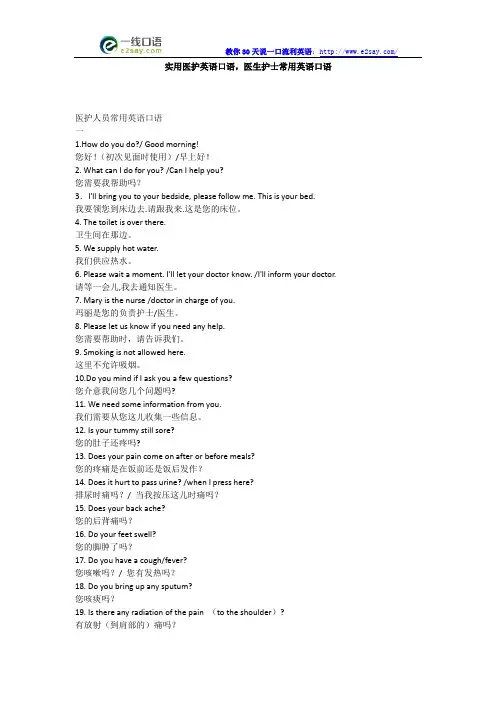
实用医护英语口语,医生护士常用英语口语医护人员常用英语口语一1.How do you do?/ Good morning!您好!(初次见面时使用)/早上好!2. What can I do for you? /Can I help you?您需要我帮助吗?3.I'll bring you to your bedside, please follow me. This is your bed.我要领您到床边去.请跟我来.这是您的床位。
4. The toilet is over there.卫生间在那边。
5. We supply hot water.我们供应热水。
6. Please wait a moment. I'll let your doctor know. /I'll inform your doctor. 请等一会儿,我去通知医生。
7. Mary is the nurse /doctor in charge of you.玛丽是您的负责护士/医生。
8. Please let us know if you need any help.您需要帮助时,请告诉我们。
9. Smoking is not allowed here.这里不允许吸烟。
10.Do you mind if I ask you a few questions?您介意我问您几个问题吗?11. We need some information from you.我们需要从您这儿收集一些信息。
12. Is your tummy still sore?您的肚子还疼吗?13. Does your pain come on after or before meals?您的疼痛是在饭前还是饭后发作?14. Does it hurt to pass urine? /when I press here?排尿时痛吗?/ 当我按压这儿时痛吗?15. Does your back ache?您的后背痛吗?16. Do your feet swell?您的脚肿了吗?17. Do you have a cough/fever?您咳嗽吗?/ 您有发热吗?18. Do you bring up any sputum?您咳痰吗?19. Is there any radiation of the pain (to the shoulder)?有放射(到肩部的)痛吗?20. How long have you had the pain?您的痛有多长时间了?21. When did the pain start? /where is your pain?疼痛从什么时候开始的/什么地方疼痛?22. Are your periods regular?您的月经规则吗?23.Will you please undress for medical examination?请您脱下衣服做体检好吗?24. Take off your clothes, please.请把衣服脱下来。
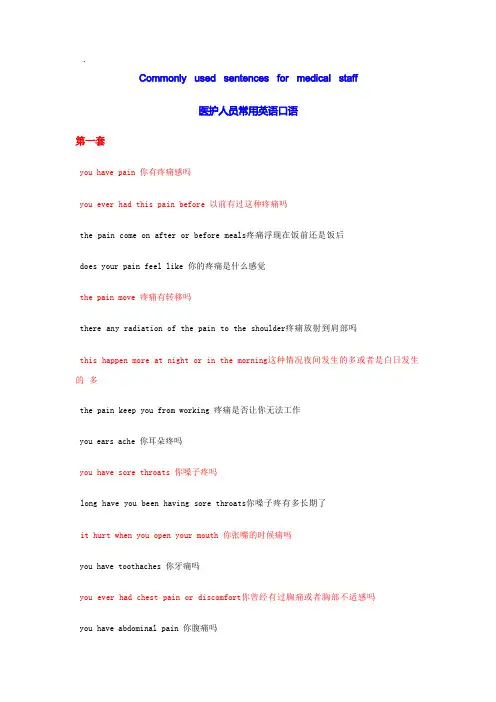
.you have pain 你有疼痛感吗you ever had this pain before 以前有过这种疼痛吗the pain come on after or before meals疼痛浮现在饭前还是饭后does your pain feel like 你的疼痛是什么感觉the pain move 疼痛有转移吗there any radiation of the pain to the shoulder疼痛放射到肩部吗this happen more at night or in the morning这种情况夜间发生的多或者是白日发生的多the pain keep you from working 疼痛是否让你无法工作you ears ache 你耳朵疼吗you have sore throats 你嗓子疼吗long have you been having sore throats你嗓子疼有多长期了it hurt when you open your mouth 你张嘴的时候痛吗you have toothaches 你牙痛吗you ever had chest pain or discomfort你曾经有过胸痛或者胸部不适感吗you have abdominal pain 你腹痛吗your tummy still sore 你肚子还痛吗your breasts painful 你乳房痛吗your back ache 你背部疼痛吗your legs hurt when you walk 你走路时腿痛吗21. You are going to have a B-mode ultrasonic exam. Please keep your bladder full. 您要做 B 超检查,请留尿,使膀胱充盈。
22. You are going to have a gastric endoscopy tomorrow morning. Please don't eat or drink anything after 12 o'clock tonight.明天上午您要做胃镜检查,今晚 12 点之后,请不要吃喝任何东西。
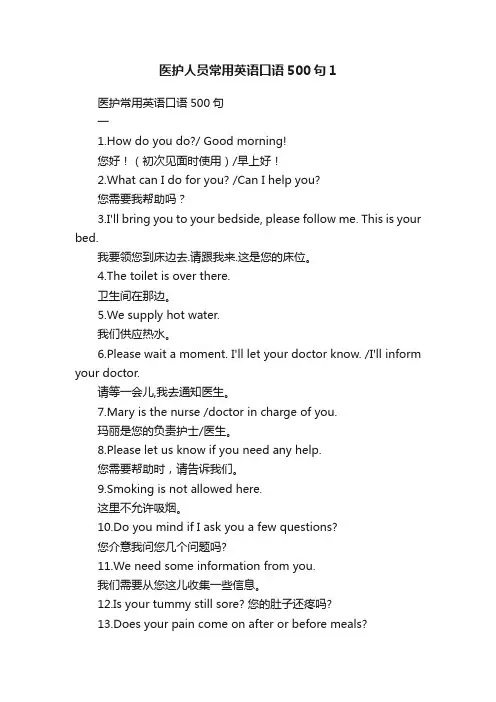
医护人员常用英语口语500句1医护常用英语口语500句一1.How do you do?/ Good morning!您好!(初次见面时使用)/早上好!2.What can I do for you? /Can I help you?您需要我帮助吗?3.I'll bring you to your bedside, please follow me. This is your bed.我要领您到床边去.请跟我来.这是您的床位。
4.The toilet is over there.卫生间在那边。
5.We supply hot water.我们供应热水。
6.Please wait a moment. I'll let your doctor know. /I'll inform your doctor.请等一会儿,我去通知医生。
7.Mary is the nurse /doctor in charge of you.玛丽是您的负责护士/医生。
8.Please let us know if you need any help.您需要帮助时,请告诉我们。
9.Smoking is not allowed here.这里不允许吸烟。
10.Do you mind if I ask you a few questions?您介意我问您几个问题吗?11.We need some information from you.我们需要从您这儿收集一些信息。
12.Is your tummy still sore? 您的肚子还疼吗?13.Does your pain come on after or before meals?您的疼痛是在饭前还是饭后发作?14.Does it hurt to pass urine? /when I press here?排尿时痛吗?/ 当我按压这儿时痛吗?15.Does your back ache?您的后背痛吗?16.Do your feet swell?您的脚肿了吗?17.Do you have a cough/fever?您咳嗽吗?/ 您有发热吗?18.Do you bring up any sputum?您咳痰吗?19.Is there any radiation of the pain (to the shoulder)?有放射(到肩部的)痛吗?20.How long have you had the pain?您的痛有多长时间了?21.When did the pain start? /where is your pain?疼痛从什么时候开始的/什么地方疼痛?22.Are your periods regular?您的月经规则吗?23.ill you please undress for medical examination?请您脱下衣服做体检好吗?24.Take off your clothes, please.请把衣服脱下来。
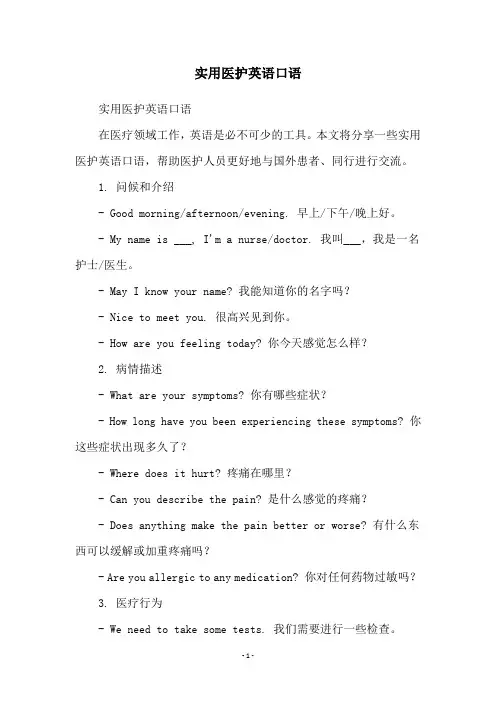
实用医护英语口语实用医护英语口语在医疗领域工作,英语是必不可少的工具。
本文将分享一些实用医护英语口语,帮助医护人员更好地与国外患者、同行进行交流。
1. 问候和介绍- Good morning/afternoon/evening. 早上/下午/晚上好。
- My name is ___, I'm a nurse/doctor. 我叫___,我是一名护士/医生。
- May I know your name? 我能知道你的名字吗?- Nice to meet you. 很高兴见到你。
- How are you feeling today? 你今天感觉怎么样?2. 病情描述- What are your symptoms? 你有哪些症状?- How long have you been experiencing these symptoms? 你这些症状出现多久了?- Where does it hurt? 疼痛在哪里?- Can you describe the pain? 是什么感觉的疼痛?- Does anything make the pain better or worse? 有什么东西可以缓解或加重疼痛吗?- Are you allergic to any medication? 你对任何药物过敏吗?3. 医疗行为- We need to take some tests. 我们需要进行一些检查。
- You need to take this medicine. 你需要服用这种药。
- We need to perform surgery. 我们需要进行手术。
- You need to stay in the hospital for a few days. 你需要在医院里待几天。
- You need to rest and avoid strenuous activities. 你需要休息并避免剧烈运动。
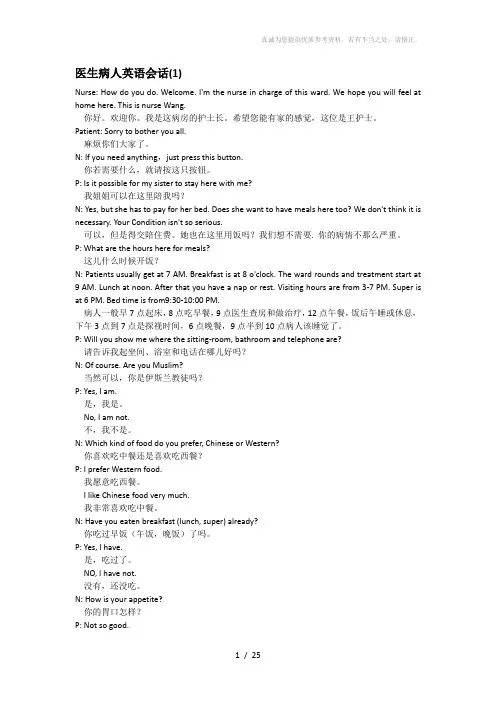
医生病人英语会话(1)Nurse: How do you do. Welcome. I'm the nurse in charge of this ward. We hope you will feel at home here. This is nurse Wang.你好。
欢迎你。
我是这病房的护土长。
希望您能有家的感觉,这位是王护士。
Patient: Sorry to bother you all.麻烦你们大家了。
N: If you need anything,just press this button.你若需要什么,就请按这只按钮。
P: Is it possible for my sister to stay here with me?我姐姐可以在这里陪我吗?N: Yes, but she has to pay for her bed. Does she want to have meals here too? We don't think it is necessary. Your Condition isn't so serious.可以,但是得交陪住费。
她也在这里用饭吗?我们想不需要. 你的病情不那么严重。
P: What are the hours here for meals?这儿什么时候开饭?N: Patients usually get at 7 AM. Breakfast is at 8 o'clock. The ward rounds and treatment start at 9 AM. Lunch at noon. After that you have a nap or rest. Visiting hours are from 3-7 PM. Super is at 6 PM. Bed time is from9:30-10:00 PM.病人一般早7点起床,8点吃早餐,9点医生查房和做治疗,12点午餐,饭后午睡或休息,下午3点到7点是探视时间,6点晚餐,9点半到10点病人该睡觉了。
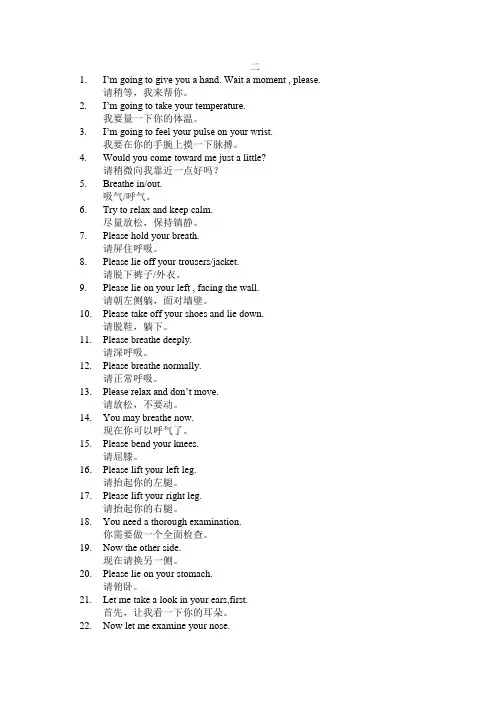
二1.I’m going to give you a hand. Wait a moment , please.请稍等,我来帮你。
2.I’m going to take your temperature.我要量一下你的体温。
3.I’m going to feel your pulse on your wrist.我要在你的手腕上摸一下脉搏。
4.Would you come toward me just a little?请稍微向我靠近一点好吗?5.Breathe in/out.吸气/呼气。
6.Try to relax and keep calm.尽量放松,保持镇静。
7.Please hold your breath.请屏住呼吸。
8.Please lie off your trousers/jacket.请脱下裤子/外衣。
9.Please lie on your left , facing the wall.请朝左侧躺,面对墙壁。
10.Please take off your shoes and lie down.请脱鞋,躺下。
11.Please breathe deeply.请深呼吸。
12.Please breathe normally.请正常呼吸。
13.Please relax and don’t move.请放松,不要动。
14.You may breathe now.现在你可以呼气了。
15.Please bend your knees.请屈膝。
16.Please lift your left leg.请抬起你的左腿。
17.Please lift your right leg.请抬起你的右腿。
18.You need a thorough examination.你需要做一个全面检查。
19.Now the other side.现在请换另一侧。
20.Please lie on your stomach.请俯卧。
医护英语对话带翻译Medical English Dialogue: Communicating with Patients。
As healthcare professionals, effective communication with patients is crucial in providing quality care. Here are some examples of medical English dialogue that can help improve communication with patients.1. Introducing Yourself。
Nurse: Good morning, my name is Sarah and I will be your nurse today. What is your name?Patient: My name is John.Nurse: Nice to meet you, John. How are you feeling today?翻译,1. 自我介绍。
护士,早上好,我叫Sarah,今天我将是你的护士。
你叫什么名字?病人,我叫John。
护士,很高兴见到你,John。
你今天感觉怎么样?2. Explaining Procedures。
Doctor: We need to take a blood sample to check your cholesterol levels. This involves inserting a needle into your arm. It might be a little uncomfortable, but it should only take a few minutes.Patient: Okay, I understand.翻译,2. 解释程序。
医生,我们需要取一份血样来检查你的胆固醇水平。
护士英文入门知识点总结1. What is Nursing?Nursing is a profession that focuses on promoting and maintaining the health of individuals, families, and communities. Nurses are responsible for providing patient care, advocating for patients, educating patients and their families, and collaborating with other healthcare professionals to deliver comprehensive care. The nursing profession encompasses various roles, including bedside nurses, advanced practice nurses, nurse educators, nurse researchers, and nurse leaders.2. Nursing EducationTo become a registered nurse (RN), you must complete a nursing education program accredited by the Accreditation Commission for Education in Nursing (ACEN) or the Commission on Collegiate Nursing Education (CCNE). There are three primary paths to become an RN: earning an associate degree in nursing (ADN), a bachelor of science in nursing (BSN), or a diploma from an approved nursing program. After completing the educational requirements, you must pass the National Council Licensure Examination for Registered Nurses (NCLEX-RN) to obtain licensure.3. Nursing SpecialtiesNursing offers various specialties and subspecialties, allowing nurses to focus on specific areas of patient care. Some common nursing specialties include critical care nursing, pediatric nursing, psychiatric-mental health nursing, labor and delivery nursing, oncology nursing, and gerontological nursing. Advanced practice nursing specialties include nurse practitioner, nurse anesthetist, nurse midwife, and clinical nurse specialist.4. Nursing SkillsNurses must possess a wide range of clinical and non-clinical skills to provide competent care to patients. Clinical skills include assessing patients, performing physical examinations, administering medications, inserting intravenous lines, providing wound care, and assisting with medical procedures. Non-clinical skills encompass communication, critical thinking, problem-solving, teamwork, leadership, and cultural competence.5. Nursing Ethics and ProfessionalismNurses are held to high ethical and professional standards as they interact with patients, families, and other healthcare professionals. The American Nurses Association (ANA) has established a code of ethics for nurses, which includes principles such as advocacy, confidentiality, accountability, and respect for human dignity. Nurses are expected to adhere to these ethical principles while providing care to their patients.6. Nursing OrganizationsThere are several professional organizations for nurses that offer support, resources, and networking opportunities for nursing professionals. Some prominent nursing organizations include the ANA, the American Association of Critical-Care Nurses (AACN), the National Association of Pediatric Nurse Practitioners (NAPNAP), and the Emergency Nurses Association (ENA). Joining a professional nursing organization can help you stay informed about industry developments and connect with colleagues in your field.7. Nursing ResearchNursing research is essential for advancing the nursing profession and improving patient outcomes. Nurses engage in research to explore healthcare interventions, evaluate nursing practices, and contribute to evidence-based practice. Understanding the basics of nursing research, including research methodologies, data analysis, and evidence-based practice, is integral to becoming a well-rounded nurse.8. Nursing LeadershipNurses have the opportunity to assume leadership roles in healthcare settings, where they can influence policy, promote quality improvement, and guide the next generation of nurses. Leadership skills such as effective communication, strategic planning, conflict resolution, and decision-making are essential for nurses in leadership positions. As a beginner in the field, it is beneficial to learn about leadership principles and how they apply to nursing practice.9. Nursing TechnologyThe use of technology in nursing has become increasingly prevalent, with electronic health records (EHRs), telehealth, and medical devices playing a significant role in patient care. Nurses should be proficient in using healthcare technology to document patient information, communicate with interdisciplinary teams, and facilitate remote patient monitoring. Familiarizing yourself with nursing technology is crucial for providing efficient and effective care.10. Continuing EducationNursing is a dynamic and constantly evolving field, requiring nurses to engage in lifelong learning to stay current with best practices and advancements in healthcare. Continuing education options for nurses include pursuing advanced degrees, obtaining specialty certifications, attending workshops and conferences, and participating in professional development activities. Earning continuing education credits is often a requirement for maintaining nursing licensure.In conclusion, nursing is a rewarding and challenging profession that offers a diverse range of opportunities for individuals passionate about healthcare. By understanding the essential knowledge points outlined in this article, you can lay a solid foundation for your nursing career and embark on a fulfilling journey of caring for others and making a positive impacton the world. Whether you are just beginning your nursing education or are already working as a nurse, ongoing learning and professional development are key to thriving in this dynamic profession.。
医护英语单词
医护英语单词:medical care。
例句:
1、一名警察,接着是一名医护人员试图把她救醒。
A policeman and then a paramedic tried to resuscitate her.
2、你的医护需求由你自己挑选的一名医生,即初级保健医生来协调。
Your health care needs are coordinated by a physician you select called a Primary Care Physician (PCP).
3、有些系统也会告知政府或医护人员。
Some systems also tell governments or health care workers.
4、万多名医护人员抵达武汉救助病人。
More than 30,000 medical workers came to Wuhan to help the sick people.
5、他尽其所能保住医护人员的性命。
He tried his best to keep life going for the doctors and nurses.
6、记住,你的医生和其他医护人员是站在你这边的。
Remember, your doctor and other caregivers are on your side.。
二1.I’m going to give you a hand. Wait a moment , please.请稍等,我来帮你。
2.I’m going to take your temperature.我要量一下你的体温。
3.I’m going to feel your pulse on your wrist.我要在你的手腕上摸一下脉搏。
4.Would you come toward me just a little?请稍微向我靠近一点好吗?5.Breathe in/out.吸气/呼气。
6.Try to relax and keep calm.尽量放松,保持镇静。
7.Please hold your breath.请屏住呼吸。
8.Please lie off your trousers/jacket.请脱下裤子/外衣。
9.Please lie on your left , facing the wall.请朝左侧躺,面对墙壁。
10.Please take off your shoes and lie down.请脱鞋,躺下。
11.Please breathe deeply.请深呼吸。
12.Please breathe normally.请正常呼吸。
13.Please relax and don’t move.请放松,不要动。
14.You may breathe now.现在你可以呼气了。
15.Please bend your knees.请屈膝。
16.Please lift your left leg.请抬起你的左腿。
17.Please lift your right leg.请抬起你的右腿。
18.You need a thorough examination.你需要做一个全面检查。
19.Now the other side.现在请换另一侧。
20.Please lie on your stomach.请俯卧。
医务人员常用英语(5篇材料)第一篇:医务人员常用英语医务人员常用语1. What can do for you?你有什么事?2.May I help you?我能帮你什么忙?8.Please take a seat!please sit down!请坐下.4.Wait a moment,please.请等一等.5.Sorry to have kept you waiting.对不起让你久等了.6.It is not serious.病情不严重.7.Don't worry.There is nothing to worry about.不必顾虑。
8.You need a thorough examination.你需要做一个全面检查.9.You will have to stay in hospital for sevral days.你需要在医院里住几夭.We think that you had better be hospitalized我们认为你最好住进医院来。
10. You should stay in bed for a few days.你需要卧床几天.11. You can keep on working.You can carry on with your work.可以继续工作。
12. You should be very careful for a week or two这一两周内,你需要很注意。
13.Try to relax and keep calm.尽量放松保持镇静。
14. You'll soon be all right.你很快就会好起来的.15. 1'm sure this medicine will help you a great deal.这药对你肯定会很有效的.16. Feeling well again is a rather slow process,I'm afraid.恐怕痊愈将是一个很慢的过程.17. You will have to wait for twenty minutes.你需要等20分钟.18.Complete recovery will take a rather long time.彻底恢复需要一段很长的时间。
500 Nursing Sentenses(护士常用语500句) (问候致意用语)1. How are you? 你好吗?2. Glad to meet you.认识您,我很高兴。
3. Good morning, Miss Paine. I am nurse Johnson. 早上好,帕恩小姐。
我是约翰逊护士。
4. Mr.and Mrs.Gates, my name is Miss White.I am a nurse.盖茨先生和盖茨太太好,我是怀特小姐,是名护士。
5. Hello, I am nurse Hunt. Are you Mrs, Bill?你好,我是亨特护士。
你是比尔夫人吗?6. Hi, Peter, I’m your nurse. Who is here with you today?你好,彼得,我是负责你的护士。
今天是谁陪你来的?7. Hello, Mr. George. Nice to see you again . How have you been? 你好,乔治先生,很高兴再次见到你,最近还好吗?8. You’re looking better today.你今天看上去好多了。
9. Hello, I haven’t seen you for a long time . How’s everything gong? 您好,我很久没有见到您了,一切都好吗?10. How are you feeling today? 你今天感觉如何?11. May I help you?我能帮你吗?12.What can I do for you ? 我能为你效劳吗?13. What’s the trouble? 有什么不舒服吗?14. Please come in and have a seat. 请进,随便坐。
15. Please take a seat!/Please sit down! 请坐下!16. Wait a moment ,Please. 请等一会。
17. Sorry to have kept you waiting . 对不起让你久等了。
18. It’s nice weather today .How did you come here ?今天天气真好,你怎么来这儿的?19.Did you have any trouble finding us today? 今天来找我们还顺利吗?20. How was the traffic? 路上交通状况怎么样?(介绍情况和安慰用语)21. My name is Helen. I’m your primary nurse. 我的名字叫海伦。
我是负责你的护士。
22. She is the head nurse of the ward. 她是这个病房的护士长。
23. This is ward 3 and here is your room . 这是三号病房,是你的房间。
24. Patients usually get up at 7 a.m. and breakfast is at 8. 病人一般早晨7:00起床,8:00吃早餐。
25. We’re serving breakfast right now. 我们现在正在供应早餐。
26. Lunch is at 12:30.Patients can have a rest after that. 午餐时间是12:30,饭后病人可以午休。
27.Bed times is from 9:30 to 10 p.m. 病人应在晚上9:30~10:00上床睡觉。
28. The ward rounds and treatment start at 9 a,m . 9:00开始查房,做治疗。
29. You can watch TV ,but please don’t bother the others . 你可以看电视,但请不要妨碍其他人。
30. Your family may stay here with you from 9 a.m to 9 p.m . 你的家人可以从早九点到晚九点在这里陪护你。
31. You should sign the consent . 你需要签署一份手术同意书。
32. I’ll give you an enema tonight. After that please don’t take any food or water before theoperation. 今晚我要给你灌一次肠,灌肠后直至手术前请不要吃东西或喝水。
33. We are going to do the operation on you tomorrow. I hope you won’t worry. 我们明天就要给你做手术,希望你不要紧张/担心。
34. The doctor who will operate on you is very experienced and considerate. 给你做手术的医生很有经验,而且耐心细致。
35. We’ll give you anesthesia. Please let me know if you feel any pain during the operation. 我们会使用麻醉药,不过手术期间如果你感到疼痛,就告诉我。
36. If you have any discomfort during the operation ,please don’t hesitate to tell me . 手术中有什么不舒服,请尽快告诉我,不要犹豫。
37. If you have any problems, please let me know. 有什么不舒服尽管告诉我。
38. I’m afraid you’re still too feeble to get up. 恐怕你太虚弱,还不能下床。
39. Ring any time you need help. 需要帮助时请随时按铃。
40. If you need anything , just ring the bell. 如果你有什么需要就按铃。
41. The operation went very well. 手术很顺利/成功。
42. Please turn from side to side every two or three hours. 请你每两三个小时翻一次身。
43. I’m going to empty the bedpan. 你去把便盆倒掉。
44. You have to stay here for another two weeks. 你还得再在医院住两周。
(询问病情用语)Inquiring the reasons for seeing doctor(问就诊原因)45. How are you feeling today? 今天你感觉怎么样?46. How do you feel today? Is there anything wrong? 你今天感觉怎么样?有什么不舒服吗?47. What’s the matter with you? 你怎么不舒服?48. What’s bothering you? 你哪儿不舒服?49. Can you tell me about your problem? 你能告诉我你的问题吗?50. What kind of difficulties are you having ? 你最近有什么问题?51. What sort of problem have you been having? 你现在有什么问题?52. What symptoms do you have? 你有些什么样的症状?53. Tell me about your trouble , please. 请告诉我你哪儿不舒服54. Tell me what’s wrong? 告诉我哪儿不好?55. Tell me why you came today? 告诉我你今天为什么来这?56. What do you think is wrong with you? 你认为自己有什么问题?57. You don’t look well. Is there anything wrong? 你看起来气色不好,哪儿不舒服吗?58. You look very pale . What trouble do you have? 你看上去很苍白,哪儿不舒服吗?59. How did it happen? 这是怎么发生的?60. How long have you felt sick? 你病了多久了?61. What do you think causes the symptom? 你觉得引起这个症状的原因是什么?62. What do you think provokes it? 你认为是什么诱发出这种症状的?63. When did it begin (start)? 什么时候开始的?64. When did you begin feeling sick ? 你是什么时候感觉身体不舒服的?65. When did you begin to notice these symptoms? 你是什么时候开始发现这些症状的?66. When did you first complain ? 你最初的症状是什么?67. Have you noticed any of these symptoms recently? 最近你注意到有这些症状吗?68. When did you first notice it ? 你第一次注意到这种情况是什么时候?69. Has this happened before? 这种情况以前发生过吗?70. Have you had similar trouble before? 你以前有过类似的毛病吗?71. Have you ever felt anything like this before? 以前你有过类似的感觉吗?72. Have your noticed any change recently? 最近你注意到有什么变化没有?73. Was it better or worse during the summer? 夏天时这个症状是好些还是更糟?74. How often are the attacks? 多久发作一次?75. How long does each episode last? 每次发作持续多久?76. How long has this been a problem? 这个问题有多长时间了?77. How long have you been like this ? 你这种症状持续多长时间了?78. How often does it happen , once a day ,a weak ,or a month? 这种情况多久发生1次,1天1次,1周1次还是1个月1次?79. Is the condition serious? 病情严重吗?80. Has it gotten worse? 病情加重了吗?81. Do you feel you have a serious illness? 你觉得你得了重病吗?82. Have you noticed anything that makes it worse ? 你注意到有什么事情让这种症状加重吗?83. Is the problem getting worse , better , or staying the same? 这个问题变得更糟了,好些了,还是保持原样?84. How bad is it ? 有多糟?85. Would you explain how bad it is ? 你能解释一下它有多糟吗?86. Are you feeling better? 你感觉好些了吗?87. When did you last feel well? 你最近一次感觉良好是什么时候?88. We need just a little more information? 我们需要了解更多的情况?89. Do you have a fever? 你发热吗?90. Do you sweat a lot ? 你出汗多吗?91. Do you feel weak ? 你感觉虚弱吗?92. Are you feeling very tired lately? 你最近感觉很疲劳吗?93. Do you become easily fatigued? 你是否变得很容易疲惫?94. Please say it again . 请再说一遍。